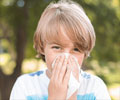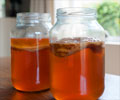Highlights
- Probiotics are known to alleviate allergy related symptoms by increasing the body's percentage of regulatory T-cells and inducing tolerance.
- Only specific probiotic combinations help in achieving the desired effects.
- A probiotic combination of lactobacilli and bifidobacteria, helped to reduce allergy-related nose symptoms and improve quality of life in people suffering from hay fever.
Probiotics are thought to work by increasing the human body's percentage of regulatory T-cells, which in turn might increase tolerance to hay fever symptoms.
Hay Fever
Hay fever also known as allergic rhinitis affects around 40 to 60 million Americans. It affects around 10%-30% of the population worldwide.
In 2012, 7.5% or 17.6 million adults and 9.0% or 6.6 million children were diagnosed with hay fever in the past 12 months.
Symptoms include runny nose, sneezing, nasal congestion and itchy nose, throat and mouth.
Further, current allergy medications have unwanted potential side effects, including dry mouth and drowsiness; thus there is an increased need for alternatives, the researchers say.
Testing Probiotic Combination
It is known that the probiotic combination of lactobacilli and bifidobacteria, sold as Kyo-Dophilus in stores, helps maintain digestive health and parts of the immune system.
"Not all probiotics work for allergies. This one did," said Jennifer Dennis, a doctoral student in the UF food science and human nutrition department in UF's Institute of Food and Agricultural Sciences and first author on the latest study.
To know if the components in this combination probiotic would help alleviate allergy symptoms, researchers conducted experiment.
The experiment was conducted at the peak of spring allergy season.
They enrolled 173 healthy adults who said they suffered seasonal allergies and randomly split them into two groups:
- one group took the combination probiotic
- other group took a placebo
DNA was analyzed from the stool samples of the participants to determine the modification of the bacteria, as probiotics aim to deliver good bacteria to the human's intestinal system.
The DNA test also confirmed who was taking the probiotic, said Bobbi Langkamp-Henken, a professor of food science and human nutrition and a senior author of the study.
Participants who took the probiotic reported improvements in quality of life, compared to those taking the placebo, the study showed.
They reported fewer allergy-related nose symptoms, which meant that they could carry on their daily activities without significant interruption.
A major limitation of the study was that it did not include severe allergy sufferers. But the probiotic combination of lactobacilli and bifidobacteria showed clinical benefit for those suffering from mild seasonal allergies, Langkamp-Henken said.
The study is published in the American Journal of Clinical Nutrition.
References
- Allergic Rhinitis - (http://acaai.org/allergies/types/hay-fever-rhinitis)
- ALLERGY STATISTICS - (http://www.aaaai.org/about-aaaai/newsroom/allergy-statistics)
- Bobbi Langkamp-Henken et al. Probiotics (Lactobacillus gasseri KS-13, Bifidobacterium bifidum G9-1, and Bifidobacterium longum MM-2) improve rhinoconjunctivitis-specific quality of life in individuals with seasonal allergies: a double-blind, placebo-controlled, randomized trial1. American Journal of Clinical Nutrition; (2017) DOI: 10.3945/ajcn.116.140012
Source-Medindia















